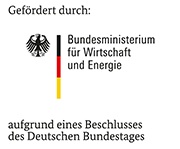14873

Hochtemperaturofen in Betrieb
| Official ID: | IGF No. 14873, FVV No. 910 |
|---|---|
| Period: | 2006-08-01 to 2010-07-31 |
| Funder: | Federal Ministry for Economics and Technology (BMWI, Germany) via AiF Research Association for Combustion Engines |
| Project Manager: | Dr. Mario Rudolphi |
| Research Group: | High Temparture Materials |
Thermal barrier coatings (TBCs) are nowadays widely applied in gas turbines and airplane engines to allow higher operating temperatures and thus higher efficiencies. The porous ceramic top coating (typically yttria stabilized zirconia, YSZ) in conjunction with active cooling of the base material leads to the formation of a thermal gradient between hot gas and turbine component. Consequently, the gas temperature can be raised without reaching critical temperatures in the component base material.
However, the TBC may fail (i.e. crack or spall) during operation as a result of several degradation mechanisms, such as, micro-crack growth induced by thermal and/or mechanical loading or chemical degradation. Currently there is a considerable deficit in the knowledge of the evolution of crack initiation and crack growth up to macroscopic delamination. Therefore it is necessary to develop a deeper understanding of the damage evolution processes under isothermal, thermo-cyclic, but also thermo-mechanical loading conditions.
The aim of this work is to develop a TBC lifetime model for currently used atmospheric plasma sprayed (APS) thermal barrier coating systems based on the mechanical strain necessary to cause failure of the coating.
back
Das IGF-Vorhaben Nr. 14873 der Forschungsvereinigung DECHEMA e.V., Theodor-Heuss-Allee 25, 60486 Frankfurt am Main wurde über die AiF im Rahmen des Programms zur Förderung der industriellen Gemeinschaftsforschung (IGF) vom Bundesministerium für Wirtschaft und Energie aufgrund eines Beschlusses des Deutschen Bundestages gefördert.
Dr. Mario Rudolphi
Tel.: +49 69 / 7564-492
E-mail: mario.rudolphi
Final Report (pdf, 8.5 MB, in German)